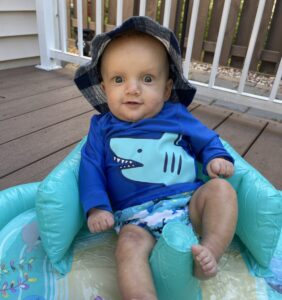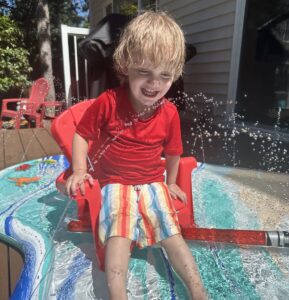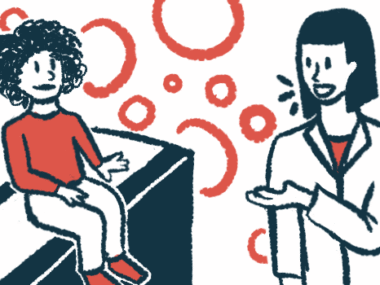Worrying about water play for our son with Alagille syndrome
Our youngest son's dry skin and itchiness raised concerns about his comfort
Written by |

Our kids love the water. When our lovely Pacific Northwest weather finally turns warm enough, they both beg to pull the inflatable pool from storage. They’d stay out there all day if we let them. It’s interesting to reflect on how, early in our son Finley’s Alagille syndrome diagnosis journey, we worried about his exposure to water and how it could affect his daily life.
Liver disease is a challenging, complicated topic to navigate. Even with three years of knowledge of our son’s condition under my belt, I’m still learning more each and every day. A few things along the way have worried us, one of those being baths and water play.
I’ve written here about the itch of cholestatic pruritus. Combined with skin that’s more prone to drying out from liver disease, you have the perfect recipe for an itchy, uncomfortable child. We were informed that exposure to water could dry out his skin, so we should try to keep baths short and as infrequent if possible.
My wife and I are always trying everything we can to help our son be comfortable and thrive, so we took this advice to heart. Bathtime with Finley now came with worries. How could we tell if he was getting itchy? Was he itchy from the water or from his cholestatic pruritus? Did we put enough lotion on to keep him comfortable? So many thoughts focused around a normal activity that should have been simple.
When Finley was about 6 months old, we moved to our current house. Unfortunately for us, there happened to be a record-breaking heat wave in the state of Washington at that time. We’ve since added air conditioning, and having a cool room at night helps Finley sleep. But when we first arrived at the new house, with no AC, the inside was extremely hot. As a parent of a child with Alagille syndrome, I had high anxiety about my son’s comfort.
During that week, we relied on cool baths to keep the boys happy and relaxed. At that point, Finley had absolutely fallen in love with the water. My wife and I decided to put some of our worries aside when it came to water exposure. We let Finley stay in the bath longer. He loved to splash and kick, enjoying the soothing time. I was able to release some of my worry and stress. We let him be who he is — a kid who loves water.
As Finley has aged, his passion hasn’t changed. Following in the footsteps of his older brother, Jackson, Finley loves water play. It clearly brings him immense joy. I love watching him play and experiment. Easing up on the worries allowed for more opportunities for joy.
We’re still hyperaware of his itch, of course, and the accompanying symptoms. I don’t think I’ll ever be able to fully put that worry aside. But I’ve gotten better about letting him just be a kid.
Finley, and everyone with a rare genetic condition, deserves to live their life to the fullest. For our son, that includes water play.
Note: Liver Disease News is strictly a news and information website about the disease. It does not provide medical advice, diagnosis, or treatment. This content is not intended to be a substitute for professional medical advice, diagnosis, or treatment. Always seek the advice of your physician or other qualified health provider with any questions you may have regarding a medical condition. Never disregard professional medical advice or delay in seeking it because of something you have read on this website. The opinions expressed in this column are not those of Liver Disease News or its parent company, Bionews, and are intended to spark discussion about issues pertaining to liver disease.






Leave a comment
Fill in the required fields to post. Your email address will not be published.